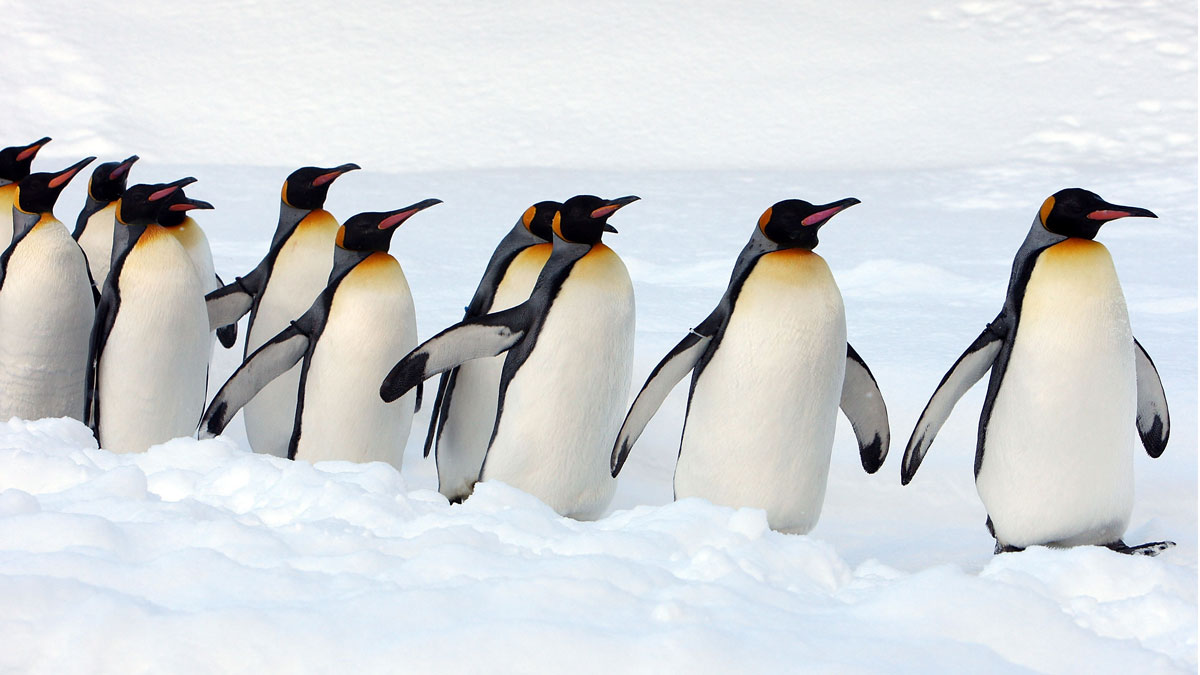Scientists discover secret 'supercolony' of penguins in Antarctica
Scientists had previously feared that the Adélie penguins' numbers had been in decline because of climate change

A free daily email with the biggest news stories of the day – and the best features from TheWeek.com
You are now subscribed
Your newsletter sign-up was successful
Scientists have discovered a previously unknown “supercolony” of Adélie penguins in the Antarctic.
Numbering more than 1.5 million birds, they were first noticed “when great patches of their poo, or guano, showed up in pictures taken from space,” says the BBC.
The researchers, who detail the discovery in the journal Scientific Reports, say it is a total surprise.
The Week
Escape your echo chamber. Get the facts behind the news, plus analysis from multiple perspectives.

Sign up for The Week's Free Newsletters
From our morning news briefing to a weekly Good News Newsletter, get the best of The Week delivered directly to your inbox.
From our morning news briefing to a weekly Good News Newsletter, get the best of The Week delivered directly to your inbox.
“It's a classic case of finding something where no-one really looked! The Danger Islands are hard to reach, so people didn't really try that hard,” team-member Dr Tom Hart from Oxford University, UK, told the BBC.
“When we first got these pixels of guano, I thought it might be a false alarm,” Heather Lynch, another team-member told The Wall Street Journal, adding, “It wasn’t. We had massive penguin colonies that had not been known to exist.”
“The sheer size of what we were looking at took our breath away. We thought, if what we're seeing is true, these are going to be some of the largest Adélie penguin colonies in the world, and it's going to be well worth our while sending in an expedition to count them properly.”
The discovery has eased fears that numbers of Adelie penguins had been in decline for decades due to climate change.
A free daily email with the biggest news stories of the day – and the best features from TheWeek.com
“Not only do the Danger Islands hold the largest population of Adélie penguins on the Antarctic Peninsula, they also appear to have not suffered the population declines found along the western side of Antarctic Peninsula that are associated with recent climate change,” said Professor Michael Polito, an ecologist at the Louisiana State University who participated in the research.
“It puts the East Antarctic Peninsula in stark contrast to the Adélie and chinstrap penguin declines that we are seeing on the West Antarctic Peninsula,” said Hart.
“It’s not clear what the driver of those declines is yet; the candidates are climate change, fishing and direct human disturbance, but it does show the size of the problem.”
This stark comparison “suggests penguins fare much better when their environments are completely undisturbed, a finding that reinforces calls from environmentalists for a protects area in the Weddell Sea, where the Danger Islands are located,” says BusinessInsider.
A breakthrough discovery of this scale “offers ecologists hope: Even in the age of Google Earth, maybe we don’t know our planet as well as we think we do,” says Quartz.
-
 Political cartoons for February 19
Political cartoons for February 19Cartoons Thursday’s political cartoons include a suspicious package, a piece of the cake, and more
-
 The Gallivant: style and charm steps from Camber Sands
The Gallivant: style and charm steps from Camber SandsThe Week Recommends Nestled behind the dunes, this luxury hotel is a great place to hunker down and get cosy
-
 The President’s Cake: ‘sweet tragedy’ about a little girl on a baking mission in Iraq
The President’s Cake: ‘sweet tragedy’ about a little girl on a baking mission in IraqThe Week Recommends Charming debut from Hasan Hadi is filled with ‘vivid characters’
-
 Epstein files topple law CEO, roil UK government
Epstein files topple law CEO, roil UK governmentSpeed Read Peter Mandelson, Britain’s former ambassador to the US, is caught up in the scandal
-
 Iran and US prepare to meet after skirmishes
Iran and US prepare to meet after skirmishesSpeed Read The incident comes amid heightened tensions in the Middle East
-
 Israel retrieves final hostage’s body from Gaza
Israel retrieves final hostage’s body from GazaSpeed Read The 24-year-old police officer was killed during the initial Hamas attack
-
 China’s Xi targets top general in growing purge
China’s Xi targets top general in growing purgeSpeed Read Zhang Youxia is being investigated over ‘grave violations’ of the law
-
 Panama and Canada are negotiating over a crucial copper mine
Panama and Canada are negotiating over a crucial copper mineIn the Spotlight Panama is set to make a final decision on the mine this summer
-
 Why Greenland’s natural resources are nearly impossible to mine
Why Greenland’s natural resources are nearly impossible to mineThe Explainer The country’s natural landscape makes the task extremely difficult
-
 Iran cuts internet as protests escalate
Iran cuts internet as protests escalateSpeed Reada Government buildings across the country have been set on fire
-
 US nabs ‘shadow’ tanker claimed by Russia
US nabs ‘shadow’ tanker claimed by RussiaSpeed Read The ship was one of two vessels seized by the US military